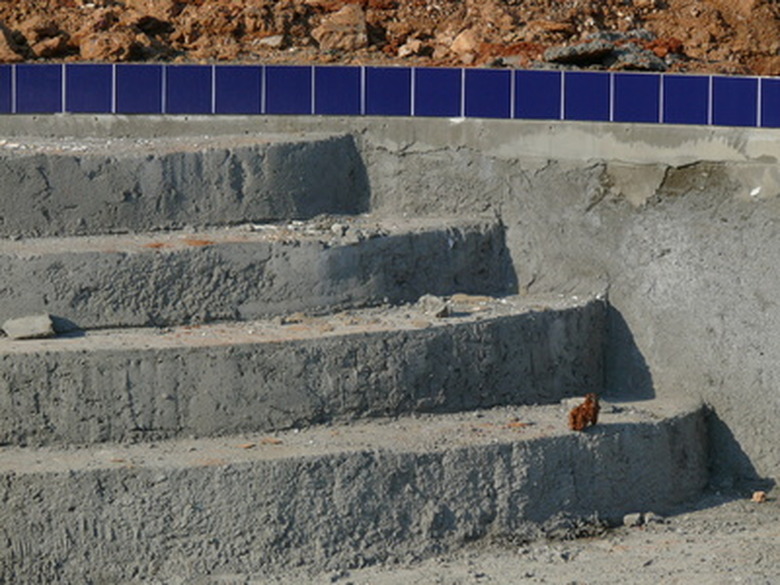Problems With Gunite Pools
Gunite pools are among the most common pools built for home use. Made from a mixture of sand, cement and water, gunite pools are highly durable and offer owners a wide range of design options. Gunite pools are finished with plaster or tiles, depending on the owner's preference. You can also customize the size and shape of a gunite pool, which is not always possible with vinyl-lined or fiberglass pools. However, several problems come with gunite pools that you should know about before purchasing this pool for your home.
Longer Construction Times
Compared to fiberglass or vinyl liner pools, gunite pools have significantly longer construction times. Fiberglass pools are installed in approximately two weeks while gunite pools can take anywhere from 8 to 12 weeks to construct due to the fact that all of the construction for a gunite pool is performed on site. You must excavate the pool area, lay pipes and place a rebar framework grid in the ground, and then spread a heavy coat of the gunite around the framework and smooth it so the surface is even. The pool must sit for approximately a week before applying the finish.
Require More Maintenance
Because gunite pools often have an uneven texture, they provide the ideal surface for algae to grow, which means that gunite pool owners must become diligent about testing and maintaining the chemical balance of the water–more so than fiberglass or vinyl liner pool owners. Gunite pool owners must test the pH balance and chlorine levels of the water at least two to three times a week. If your pool has a high pH and a low chlorine level, algae can begin to bloom. In addition, gunite pool owners must brush or scrub the walls of the pool on a regular basis to prevent dirt and other debris from settling in the wall's pores, which can encourage algae growth as well.
Rough Texture
Depending on how a gunite pool is finished, the uneven texture of the plaster is generally rough against the skin. In some cases, individuals may tear up their feet from the gunite's roughness. Some pool owners with children opt for a fiberglass pool over gunite because they do not have to worry about their children's feet becoming cut or scraped on the smooth fiberglass surface.
Require Frequent Refinishing
You must refinish the surface of a gunite pool every few years, which may include sandblasting and repainting the walls, resetting loose tiles or removing stains in plaster. The process is time consuming, so many pool owners hire professionals for the task, which is generally quite costly.
More Complex Repairs
While a gunite pool is highly durable, the plaster used in construction often begins to show signs of wear and tear as the pool ages. The walls may begin to crack, hollow spots may develop and the plaster may begin to chip. Plumbing leaks can develop as well. While fiberglass and vinyl liner pools are also susceptible to damage, repairs are needed more often with gunite pools because they are not flexible, so they often experience damage when the ground expands in winter. Repairs for gunite pools are typically more complex and expensive because repairing concrete is more difficult.
